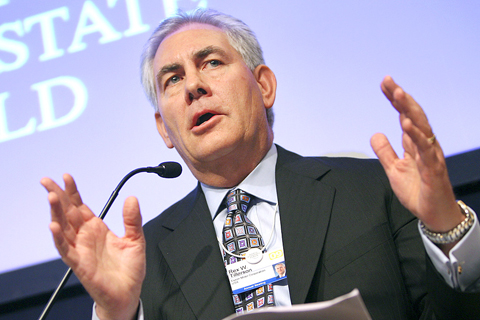Exxon Mobil on Friday notched a record US$45.22 billion profit last year despite a 33 percent income decline in the fourth quarter as the oil giant rode out high volatility in energy prices.
It was the biggest annual profit declared by any publicly listed company in the world, coming on the back of crude’s triple-digit price for most of the year, rocketing to a record peak above US$147 a barrel in July. The Irving, Texas-based company shattered its own annual profit record of US$40.6 billion posted in 2007 even as fourth-quarter income declined to US$7.82 billion.
The quarterly drop in earnings was the biggest since 2001 as oil prices collapsed at the end of last year amid financial turmoil in the US and most of the industrialized world.

PHOTO: BLOOMBERG
Its quarterly profit even then was equivalent to US$1.55 per share, beating analyst expectations of US$1.45.
Exxon, also the largest US oil producer, said capital and exploration spending rose 11 percent to US$6.8 billion in the fourth quarter, taking such expenditures for the whole year to US$26.1 billion.
“ExxonMobil’s financial strength continued to support its disciplined capital investment approach in the midst of a growing global economic slowdown,” company chairman Rex Tillerson said in a statement.
He said that weaker crude oil prices, higher operating expenses, lower chemical volumes and the impact of hurricanes that hit the US Gulf Coast in the fourth quarter were partly offset by higher downstream margins.
The company’s quarterly revenues fell 27.4 percent year-on-year to US$84.7 billion.
Cash flow from operations and asset sales between October and December was US$12.2 billion, the company said.
Exxon shares rose 1.19 percent to US$77.92.
Chevron, the second biggest US oil firm, reported on Friday that its final quarter net profit in last year rose marginally — less than 1 percent — to US$4.9 billion
The San Ramon, California-based company’s full year income rose 28 percent to US$23.93 billion.
Houston-based ConocoPhillips, the third biggest US oil company, was not so lucky, reporting earlier this week a quarterly loss of US$31.8 billion, the largest loss in its history, after writing off the value of key assets.
While top oil companies seemed to have pulled through the oil price slump so far, many expect this year to be a rough year for petroleum companies.
Anglo-Dutch energy giant Royal Dutch Shell announced on Thursday it made a net loss of US$2.81 billion in the final quarter as plunging oil prices slashed the value of inventories.
The loss compared with a net profit of US$8.47 billion during the fourth quarter of 2007 when crude prices were far higher, Europe’s largest oil company said.
Most oil companies are trimming investments and slashing costs as they face the biggest downturn in 25 years.

SEMICONDUCTOR SERVICES: A company executive said that Taiwanese firms must think about how to participate in global supply chains and lift their competitiveness Taiwan Semiconductor Manufacturing Co (TSMC, 台積電) yesterday said it expects to launch its first multifunctional service center in Pingtung County in the middle of 2027, in a bid to foster a resilient high-tech facility construction ecosystem. TSMC broached the idea of creating a center two or three years ago when it started building new manufacturing capacity in the US and Japan, the company said. The center, dubbed an “ecosystem park,” would assist local manufacturing facility construction partners to upgrade their capabilities and secure more deals from other global chipmakers such as Intel Corp, Micron Technology Inc and Infineon Technologies AG, TSMC said. It

People walk past advertising for a Syensqo chip at the Semicon Taiwan exhibition in Taipei yesterday.

NO BREAKTHROUGH? More substantial ‘deliverables,’ such as tariff reductions, would likely be saved for a meeting between Trump and Xi later this year, a trade expert said China launched two probes targeting the US semiconductor sector on Saturday ahead of talks between the two nations in Spain this week on trade, national security and the ownership of social media platform TikTok. China’s Ministry of Commerce announced an anti-dumping investigation into certain analog integrated circuits (ICs) imported from the US. The investigation is to target some commodity interface ICs and gate driver ICs, which are commonly made by US companies such as Texas Instruments Inc and ON Semiconductor Corp. The ministry also announced an anti-discrimination probe into US measures against China’s chip sector. US measures such as export curbs and tariffs

The US on Friday penalized two Chinese firms that acquired US chipmaking equipment for China’s top chipmaker, Semiconductor Manufacturing International Corp (SMIC, 中芯國際), including them among 32 entities that were added to the US Department of Commerce’s restricted trade list, a US government posting showed. Twenty-three of the 32 are in China. GMC Semiconductor Technology (Wuxi) Co (吉姆西半導體科技) and Jicun Semiconductor Technology (Shanghai) Co (吉存半導體科技) were placed on the list, formally known as the Entity List, for acquiring equipment for SMIC Northern Integrated Circuit Manufacturing (Beijing) Corp (中芯北方積體電路) and Semiconductor Manufacturing International (Beijing) Corp (中芯北京), the US Federal Register posting said. The